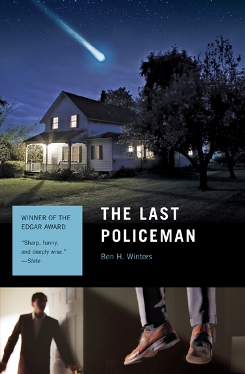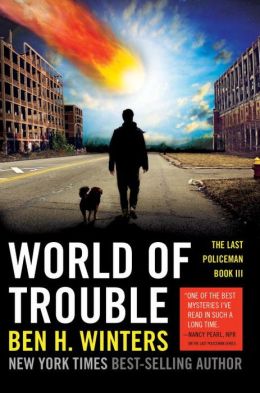Ours is not the first generation to dream that it is the last generation. In some ways, you could say that the world has been looking forward to the end since the beginning. The end of things—the end of everything—has been foretold in most major religions, and around the world, throughout history, cults have sprung up and flourished and died based solely around some vision of apocalypse. There is nothing new about the end of the world.
And yet, doesn’t it feel as if we’re living in an age obsessed with End Time visions? Is it the aftermath of 9/11—the lingering trauma of seeing skyscrapers plummet to the earth? Was it the panic that followed, all those dark warnings about mushroom clouds over cities? Is it the ongoing wars in the Middle East, the land that gave us so much of our apocalyptic literature? Or is it the simple scientific fact—often discussed but seldom confronted—that we are poisoning our planet as fast as we can? Whatever the causes, contemporary American culture has produced a glut of doomsday images—so many now that global destruction is essentially the subject of most blockbusters these days. It’s as if we’re all waiting for the worst to happen.
Maybe that’s why we need Hank Palace.

When we first meet the hero of Ben H. Winters’s Last Policeman trilogy (which began with 2012’s The Last Policeman), Palace is a recently promoted junior detective on the dwindling police force of Concord, New Hampshire. His promotion has come at—quite literally—the worst time in the world, as a gigantic asteroid named Maia has been discovered hurtling toward earth. With all life on the planet set to end in six months, society has begun to break down—triggering mass suicides, economic panic, riots, and the dissolution of governments around the world. Called to mop up what looks to be just another random suicide, Palace uncovers a murder. The Last Policeman set into motion not just the doomsday scenario that continued to play out in the 2013 sequel Countdown City and concludes with the new World Of Trouble, it also set up the essential philosophical quandary of the series: namely, what’s the point of solving crimes if everyone in the world is about to die, anyway?

The last time readers saw Hank Palace in Countdown City, society at large had finally come undone. The world had splintered into smaller and smaller groups—militias here, communes there; sex cults, religious cults, drug cults; or just tiny groups people huddled together: lovers, families, friends. Palace himself had survived near death at the hands of a mob and been whisked away to a compound populated by police officers and their families. But he couldn’t stay because he had one last duty to perform. And, with just a few days left to go, this is where World of Trouble begins.
His younger sister Nico—a reoccurring character in all three novels—has disappeared into the underground of militarized End Of Days activists who think that the government is covering up a secret technology which could knock Maia off its path. The group is loony, of course. The asteroid is coming and life will end. This is, Palace reports soberly, a fact:
It is happening. I’m right and Nico is wrong. No set of facts has ever been as rigorously vetted, no set of data points so carefully analyzed and double-checked, by as many thousands of professors and scientists and government officials. All desperate for it to be wrong, all finding it nevertheless to be right…This will happen on October 3. A week from Wednesday, around lunchtime.
Despite his sister’s flightiness and the absurdity of her “mission,” Palace cannot sit comfortably behind the walls of the police compound and wait out the end of the world. He has to go find her.
I won’t say much more about the plot of World Of Trouble because although it begins as a missing person’s case, it turns into much more as the novel progresses. What’s more important than specific plot points is the underlying philosophical quandary I mentioned earlier. In this novel the question becomes: what is the point of finding Nico if she is going to die on October 3rd like everyone else? Put more broadly, doesn’t the coming annihilation render meaningless all attempts to do good? The sci-fi/mystery set up here is, in many ways, just a way of dramatizing an ancient question. In the face of death, what is the value of moral behavior?
Does Palace think he can keep her safe? Safe from what? Does he hope for some reconciliation before the end of the world? We know from everything we learn in all three novels of the trilogy that Hank and Nico have been estranged for years. He’s always be square and stolid, and she’s always been a fierce free spirit. So why is he doing it? Well, in all the ways that matter, he’s doing it less for her than for himself. Like any great hero of fiction, Palace is simply following his own nature. As he himself explains it:
I don’t know why it matters, but I know it does…[S]ociety is dead. Civilization is burning cities, its terrified animals clustered around grain silos, stabbing each other at burned-down convenience stores for the last can of Pringles. Nevertheless—even so—here I go, charging through the darkness…
The great pleasure of The Last Policeman trilogy—and this might be particularly true for this final installment—is Hank Palace himself. World Of Trouble is a page turner, book that is riveting and humane, suspenseful rather than frenetic, and moving rather than depressing; and the key to it all is our guide trough this crumbling world. Palace is brilliant creation, the perfect hero for our eschatological age. In an era obsessed with the end of days, he is a model of grace and humanity under pressure. He isn’t some action hero killing his way through a world gone mad. He’s neither a caustic smart ass nor a monosyllabic road warrior. He is, instead, the last good man—resourceful, intrepid, and dogged. It’s a pleasure to ride with Palace toward the end of the world.
World of Trouble is available July 15th from Quirk Books.
Jake Hinkson is the author of the books Hell On Church Street, The Posthumous Man, and Saint Homicide. Read more about him at JakeHinkson.com. He also blogs at The Night Editor.










